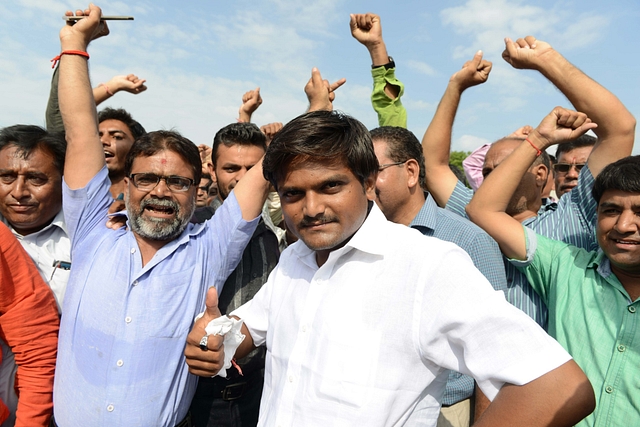Politics
Gujarat Elections: Attempts To Appease Patels With The Backward Class Tag May Backfire
- Any move by either the Congress or the Bharatiya Janata Party to appease Patels by promising them reservations under the Other Backward Class (OBC) quota will lead to a backlash from the community that forms 40 per cent of Gujarat’s population.

Hardik Patel at a rally demanding OBC status for the Patidar community (SAM PANTHAKY/AFP/Getty Images)
Hardik Patel wants to bring down the Bharatiya Janata Party (BJP) government in Gujarat, but if the opposition Congress believes it can just wait to harvest the fruits of discontent, it better think again.
The 24-year-old leader of the powerful Patidar community is steadfast in his demand that the Congress, which has smelled political power in the state after 22 years, make its stand clear on how it can meet his demands for educational and job reservations for his community within the constitutional framework. Gujarat elections will be held in two phases on 9 and 14 December while the results will be declared on 18 December.
On Saturday, Hardik Patel, who leads the Patel Anamat Andolan Samiti (PAAS) demanded the Congress clarify its stand by 3 November, when the party's vice president Rahul Gandhi addresses a rally in Surat. Else, he warned in a tweet, Congress would face consequences similar to a BJP rally in Surat in September 2016 when party president Amit Shah and other state BJP leaders were shouted down by Patidars. All India Congress Committee (AICC) general secretary and Gujarat in-charge Ashok Gehlot has welcomed Patel to meet Gandhi during his Gujarat visit from 1 to 3 November.
Gujarat Congress spokesperson Manish Doshi said the party is willing to give 20 per cent quota to Patidars and other economically backward sections and would introduce a bill if it wins the Gujarat elections. He said the Congress had in the past tried to introduce a bill in this regard in the state assembly but the ruling BJP did not allow it to do so. He said that the Congress would work for giving reservation to Patels without making any changes in the current quota limit of 49.5 per cent.
Another Congress leader, who did not wish to be named, said that the party would try to make constitutional amendments in the Parliament for giving reservation for educational institutes and government jobs to economically backward classes. He said that its approach will be more scientific in nature than the Gujarat government’s.
Patels make up 12-14 per cent of Gujarat’s population. Many members of the community are seen moving away from the BJP’s fold since the party could not fulfil its reservation demand. PAAS leader Patel, who earlier said that he was open to an alliance with Congress, has even suggested in the past that they should be given reservation for securing government jobs and getting education under the Other Backward Class (OBC) criteria. However, with OBC leader Alpesh Thakor joining the Congress, any move to appease the Patels by promising them reservation under the OBC quota will lead to a backlash from the community that forms about 40 per cent of the state’s population.
Tokenism to woo Patels?
In order to address the Patidars’ demand, the BJP government had declared 10 per cent reservation for economically backward classes among the higher castes through an ordinance in May 2016. This was in addition to a 49.5 per cent reservation for Scheduled Castes and Scheduled Tribes, and OBCs.
The capping of reservations in India are governed by a 1992 Supreme Court verdict in the matter. The quota can be reviewed if data shows that the OBC/Schedules Castes/Scheduled Tribes make up the overwhelming majority of the population, legal experts say.
Reservations, according to Alok Prasanna Kumar, visiting fellow at the Vidhi Centre for Legal Policy, are not meant to “capture” jobs and education but to redress historical under-representation of certain sections of society in government and education.
The demands for reservations from various communities including the Patels essentially stem from a lack of capacity in government institutions and differential fee structures for students of the open category as compared to the reserved categories, said Mumbai-based political analyst Jai Mrug. While stating that the 50 per cent limit posed a genuine legal barrier, he said most governments will have to think of more fundamental solutions to addressing the concerns of those who seek affirmative action.
“It is theoretically possible to cross the 50 per cent limit, either by showing exceptional circumstances or by amending the Constitution to put the Gujarat reservation law in the 9th Schedule (like the Tamil Nadu law). However, it is still subject to the Supreme Court’s finding as to whether breaching the 50 per cent limit on reservation is a violation of the basic structure of the Constitution or not,” Kumar said.
He said the move to offer reservation on economic grounds was “pure tokenism” as all such moves have been repeatedly quashed by various courts in the country.
“I don’t think a law granting reservations to Patels will stand scrutiny in the courts simply because as it stands, there is no material to show Patels are educationally and socially backward. Furthermore, reservation on purely economic grounds is not permitted under the Constitution. Unless both these change, Patels will not get reservations in government jobs and education,” said Kumar.
Introducing ElectionsHQ + 50 Ground Reports Project
The 2024 elections might seem easy to guess, but there are some important questions that shouldn't be missed.
Do freebies still sway voters? Do people prioritise infrastructure when voting? How will Punjab vote?
The answers to these questions provide great insights into where we, as a country, are headed in the years to come.
Swarajya is starting a project with an aim to do 50 solid ground stories and a smart commentary service on WhatsApp, a one-of-a-kind. We'd love your support during this election season.
Click below to contribute.
Latest